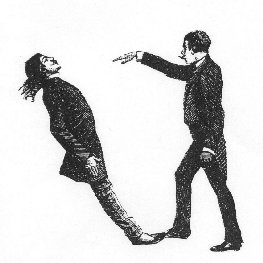“Hi, I am interested in booking some sessions. However, I’m a little worried that  it may not work on me… I have been to a hypnosis show and was one of the people selected on stage to be hypnotised – but got told to sit back down after a while as it didn’t work on me…” wrote a potential client a few days ago.
it may not work on me… I have been to a hypnosis show and was one of the people selected on stage to be hypnotised – but got told to sit back down after a while as it didn’t work on me…” wrote a potential client a few days ago.
A professional hypnotherapist will work with everyone ― not just a selected handful of the easiest and the most malleable. There is much to be written about on the subject of therapeutic hypnosis versus stage hypnosis, and no doubt I will return to the subject in future blog postings.
Even if youʹve never seen a stage hypnosis show, you may well of heard outline descriptions of it from friends or have read about it in reviews in magazines and newspapers, or seen references to it in sitcoms on television. I suggested to this enquirer that she may have got off lightly ― insofar as she had ‘escaped’ being used as entertainment fodder.
Jerry Valley, an American stage hypnotist, instructs students of stage hypnosis to ʺWatch your subjects. You can tell when a person is really paying attention by a certain fixation of their gaze.ʺ Early on in the performance a range of ʹtestsʹ will guide the hypnotist to recognise fixed gazes and behaviours such as being unable to release their fingers following the finger-lock test. This lets the hypnotist find those members of the audience who are susceptible to hypnosis. From that group, he will select certain subjects for the show who are going to be easily and effortlessly suggestible to theatrical direction. Those are the ones to become entertainment fodder.
The enquirer, who emailed a few days ago, was probably close to having the necessary susceptibility, but other audience members got closer. Remember, the stage hypnotistʹs agenda centres on setting up dramatic scenarios with willing and submissive subjects. There is no delay on stage ― no patient inquiry into the subject’s potential fears and concerns, the stage hypnotist has no awareness that a subject may be experiencing hypnosis for the first time. A stage hypnotist just wants to get on with it, and just wants you to get on with it too. Therefore a dithering, slightly nervous, anticipatory subject will not be invited onto the stage.
For now, let me say that chatting after an interactive hypnotherapy session a client will often reveal his or her amazement at how easy and effortless the hypnotherapy has been. S/he may begin to wonder in retrospect why hypnotherapy was not the first port of call. Invariably a client will say something along the lines of, ʺIʹve considered doing this for quite a whileʺ, or, ʺIʹve been thinking about this on and off for ages.ʺ Let me invite you… just like the Nike advertisement, to Just Do It!
wp-site11
Latest posts by wp-site11 (see all)
- “Sleep on it” and other Megalithic musings - August 8, 2014
- Barefoot Bohemian in Bangrak (Bang Rak), Ko Samui - June 19, 2014
- Memories Maketh up Our Minds: Part II - June 15, 2014
